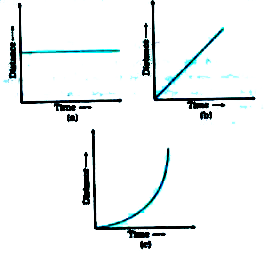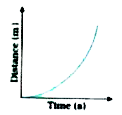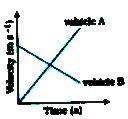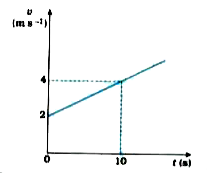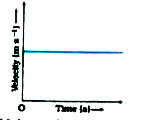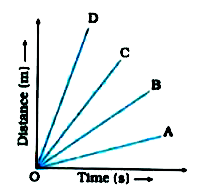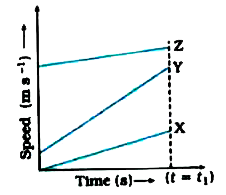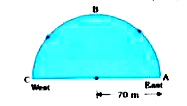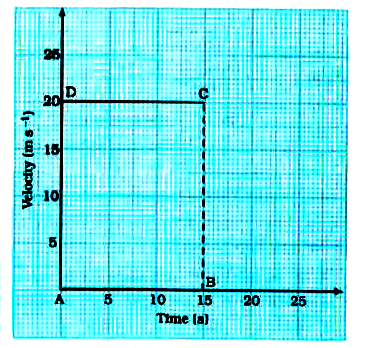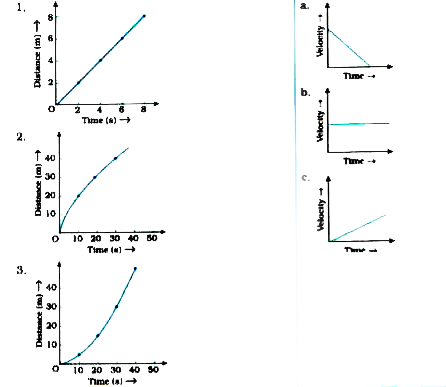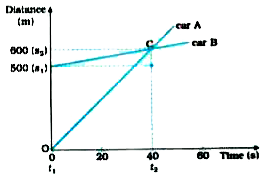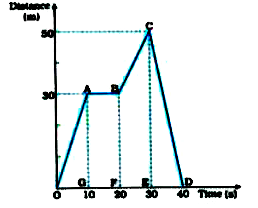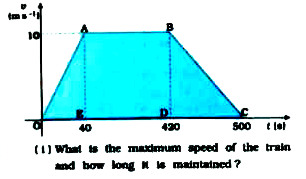TEXTBOOK EXAMPLES/NUMERICALS from KUMAR PRAKASHAN KENDRA PHYSICS (GUJRATI ENGLISH) MOTION for Class 9
| Class 9 | PHYSICS |
| Chapter | MOTION |
| KUMAR PRAKASHAN KENDRA PHYSICS (GUJRATI ENGLISH) | TEXTBOOK EXAMPLES/NUMERICALS |
| Medium | English |
| Academic Year | 2023-2024 |
Question 105
A person walks distance of 4 km from his home in the north direction. Then he covers distance of 3 km in west direction. Now t from this place he direction walks toward home on the path of minimum distance between that place and home. What would be the total Home distance covered by this person?
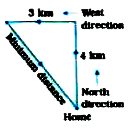 View Solution
View SolutionQuestion 106
A person walks distance of 4 km from his home in the north direction. Then he covers distance of 3 km in west direction. Now t from this place he direction walks toward home on the path of minimum distance between that place and home. What would be the total Home distance covered by this person?
 View Solution
View SolutionQuestion 267
The distance-time graph of three objects A, B and C is shown below. Study the graph and answer the following questions :
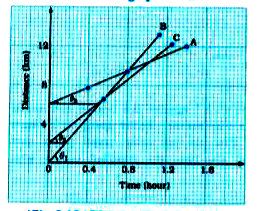
: Distance-time graph)
(a) Which of the three is travelling the fastest?
(b) Are all three ever at the same point on the road ?
(c) How far has travelled when B passes A?
(d) How far has B travelled by the time it passes C?View SolutionQuestion 268
The distance-time graph of three objects A, B and C is shown below. Study the graph and answer the following questions :

: Distance-time graph)
(a) Which of the three is travelling the fastest?
(b) Are all three ever at the same point on the road ?
(c) How far has travelled when B passes A?
(d) How far has B travelled by the time it passes C?View SolutionQuestion 273
(a) A body thrown in the vertically upward direction rises up to a height 'h' and comes back to the position of rest. Calculate the displacement of the body.
(b) A body starts to slide over a horizontal surface with an initial velocity of 0.5ms−1. Due to friction, its velocity decreases at the rate of 0.05 ms−2. How much time will it take for the body to stop ?View SolutionQuestion 274
(a) A body thrown in the vertically upward direction rises up to a height 'h' and comes back to the position of rest. Calculate the displacement of the body.
(b) A body starts to slide over a horizontal surface with an initial velocity of 0.5ms−1. Due to friction, its velocity decreases at the rate of 0.05 ms−2. How much time will it take for the body to stop ?View SolutionQuestion 277
A driver of a car travelling at the speed of 52kmh−1 applies the brakes and accelerates uniformly in the opposite direction. The car stops in 5 s. Another driver going at 34kmh−1 in another car applies his brakes slowly and stops in 10 s. On the same graph paper, plot the speed versus time graphs for the two cars. Which of the two cars travelled farther after the brakes were applied ?View SolutionQuestion 278
A driver of a car travelling at the speed of 52kmh−1 applies the brakes and accelerates uniformly in the opposite direction. The car stops in 5 s. Another driver going at 34kmh−1 in another car applies his brakes slowly and stops in 10 s. On the same graph paper, plot the speed versus time graphs for the two cars. Which of the two cars travelled farther after the brakes were applied ?View SolutionQuestion 279
The speed-time graph of a car is shown in figure given below

Speed-time graph]
(a) Find how far does the car travel in the first 4 second. Shade the area on the graph that represents the distance travelled by the car during the period.
(b) Which part of the graph represents uniform motion of the car ?View SolutionQuestion 280
The speed-time graph of a car is shown in figure given below

Speed-time graph]
(a) Find how far does the car travel in the first 4 second. Shade the area on the graph that represents the distance travelled by the car during the period.
(b) Which part of the graph represents uniform motion of the car ?View SolutionQuestion 313
An object is allowed to fall freely from the top of a 150 m high tower. At the same time another object is allowed to fall freely from the top of a 100 m high tower. If the acceleration of both the free falling objects is same, then find the difference between their heights after 2 s from their motion. How does the difference of their heights change with the time?View SolutionQuestion 314
An object is allowed to fall freely from the top of a 150 m high tower. At the same time another object is allowed to fall freely from the top of a 100 m high tower. If the acceleration of both the free falling objects is same, then find the difference between their heights after 2 s from their motion. How does the difference of their heights change with the time?View SolutionQuestion 323
An electron enters in uniform electric field with initial velocity 5×104ms−1 such that it attains the acceleration 104ms−2 in the direction of its initial motion.
(i) Calculate the necessary time required for the electron to attain the double velocity as compared to its initial velocity.
(ii) How much distance the electron would cover during this interval of time?View SolutionQuestion 324
An electron enters in uniform electric field with initial velocity 5×104ms−1 such that it attains the acceleration 104ms−2 in the direction of its initial motion.
(i) Calculate the necessary time required for the electron to attain the double velocity as compared to its initial velocity.
(ii) How much distance the electron would cover during this interval of time?View SolutionQuestion 327
A person walks 50 m in the north direction and from there he walks 30 m in the west direction.
Now, he/she walks 50 m distance in south direction. Find the distance travelled by the person and his/her displacement.
Find out the average speed and average velocity of person if he/she takes 100 s time to move from initial to final position.View SolutionQuestion 328
A person walks 50 m in the north direction and from there he walks 30 m in the west direction.
Now, he/she walks 50 m distance in south direction. Find the distance travelled by the person and his/her displacement.
Find out the average speed and average velocity of person if he/she takes 100 s time to move from initial to final position.View SolutionQuestion 343
A man walks 1.5 m in the east direction, then he walks 2.0 m in south direction and at last walks 4.5 m in the east direction, then using appropriate scale (e.g., 1 cm = 1 m) using scale... ( i ) Calculate the distance covered by the man. (ii) Find the resultant displacement (magnitude) of the man.View SolutionQuestion 345
A girl walks from her house on a straight path to drop a letter in the letter-box. Then she returns to the origin point. Her displacementtime graph is shown in the figure, draw its velocity-time graph.
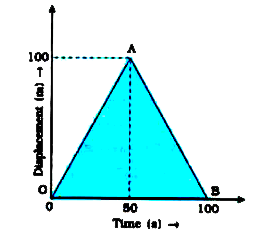
→ Slope of the graph OA = Velocity
=100−050−0=+2ms−1
Slope of the graph AB = Velocity
=0−100100−50=−2ms−1
→It is clear from the given displacement-time graph that the girl moves with constant positive velocity v from O to A. At point A for a moment her velocity becomes zero and moves back to origin (her house) at constant negative velocity by changing the View SolutionQuestion 346
A girl walks from her house on a straight path to drop a letter in the letter-box. Then she returns to the origin point. Her displacementtime graph is shown in the figure, draw its velocity-time graph.

→ Slope of the graph OA = Velocity
=100−050−0=+2ms−1
Slope of the graph AB = Velocity
=0−100100−50=−2ms−1
→It is clear from the given displacement-time graph that the girl moves with constant positive velocity v from O to A. At point A for a moment her velocity becomes zero and moves back to origin (her house) at constant negative velocity by changing the View Solution
All Exercises from KUMAR PRAKASHAN KENDRA PHYSICS (GUJRATI ENGLISH) Class 9 PHYSICS MOTION
- ACTIVITY
- THINK AND ACT
- ADDITIONAL NUMERICALS FOR PRACTICE
- ANSWER THE FOLLOWING
- CHOOSE CORECT OPTION
- DISTINGUISH BETWEEN THE FOLLOWING
- FILL IN THE BLANKS
- INTEXT QUESTIONS AND ANSWERS
- MATCH THE FOLLOWING
- QUESTION AND ANSWER
- QUESTION IN SHORT
- STATEMENTS
- TEXTBOOK EXAMPLES/NUMERICALS
- TRUE OR FALSE
- EXAMPLE
